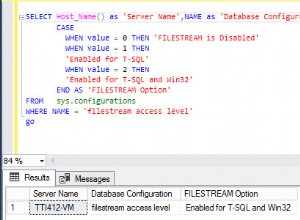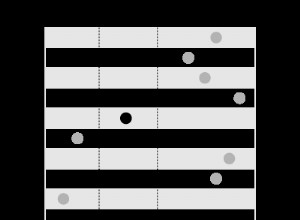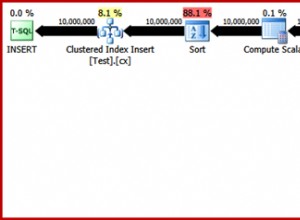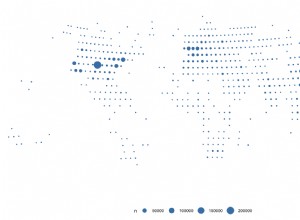Hace algunos años tuve el mismo problema.
En aquel entonces, tenía que admitir Oracle 9 y 10, por lo que el código solo se ocupa de esas versiones, pero tal vez le ahorre algunas investigaciones. La idea es:
- busque en el registro para determinar la versión del cliente de Oracle
- trate de encontrar ORACLE_HOME
- obtener finalmente los tnsnames de HOME
public enum OracleVersion
{
Oracle9,
Oracle10,
Oracle0
};
private OracleVersion GetOracleVersion()
{
RegistryKey rgkLM = Registry.LocalMachine;
RegistryKey rgkAllHome = rgkLM.OpenSubKey(@"SOFTWARE\ORACLE\ALL_HOMES");
/*
* 10g Installationen don't have an ALL_HOMES key
* Try to find HOME at SOFTWARE\ORACLE\
* 10g homes start with KEY_
*/
string[] okeys = rgkLM.OpenSubKey(@"SOFTWARE\ORACLE").GetSubKeyNames();
foreach (string okey in okeys)
{
if (okey.StartsWith("KEY_"))
return OracleVersion.Oracle10;
}
if (rgkAllHome != null)
{
string strLastHome = "";
object objLastHome = rgkAllHome.GetValue("LAST_HOME");
strLastHome = objLastHome.ToString();
RegistryKey rgkActualHome = Registry.LocalMachine.OpenSubKey(@"SOFTWARE\ORACLE\HOME" + strLastHome);
string strOraHome = "";
object objOraHome = rgkActualHome.GetValue("ORACLE_HOME");
string strOracleHome = strOraHome = objOraHome.ToString();
return OracleVersion.Oracle9;
}
return OracleVersion.Oracle0;
}
private string GetOracleHome()
{
RegistryKey rgkLM = Registry.LocalMachine;
RegistryKey rgkAllHome = rgkLM.OpenSubKey(@"SOFTWARE\ORACLE\ALL_HOMES");
OracleVersion ov = this.GetOracleVersion();
switch(ov)
{
case OracleVersion.Oracle10:
{
string[] okeys = rgkLM.OpenSubKey(@"SOFTWARE\ORACLE").GetSubKeyNames();
foreach (string okey in okeys)
{
if (okey.StartsWith("KEY_"))
{
return rgkLM.OpenSubKey(@"SOFTWARE\ORACLE\" + okey).GetValue("ORACLE_HOME") as string;
}
}
throw new Exception("No Oracle Home found");
}
case OracleVersion.Oracle9:
{
string strLastHome = "";
object objLastHome = rgkAllHome.GetValue("LAST_HOME");
strLastHome = objLastHome.ToString();
RegistryKey rgkActualHome = Registry.LocalMachine.OpenSubKey(@"SOFTWARE\ORACLE\HOME" + strLastHome);
string strOraHome = "";
object objOraHome = rgkActualHome.GetValue("ORACLE_HOME");
string strOracleHome = strOraHome = objOraHome.ToString();
return strOraHome;
}
default:
{
throw new Exception("No supported Oracle Installation found");
}
}
}
public string GetTNSNAMESORAFilePath()
{
string strOracleHome = GetOracleHome();
if (strOracleHome != "")
{
string strTNSNAMESORAFilePath = strOracleHome + @"\NETWORK\ADMIN\TNSNAMES.ORA";
if (File.Exists(strTNSNAMESORAFilePath))
{
return strTNSNAMESORAFilePath;
}
else
{
strTNSNAMESORAFilePath = strOracleHome + @"\NET80\ADMIN\TNSNAMES.ORA";
if (File.Exists(strTNSNAMESORAFilePath))
{
return strTNSNAMESORAFilePath;
}
else
{
throw new SystemException("Could not find tnsnames.ora");
}
}
}
else
{
throw new SystemException("Could not determine ORAHOME");
}
}




